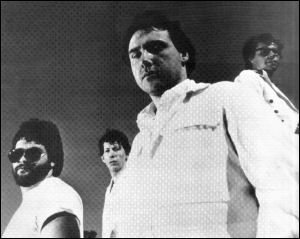 Here Come The People
Here Come The People
Like many bands, New Musik formed from a combination of longstanding friendships and chance meetings. Tony Mansfield and Clive Gates first met in November 1972 in a pub in Wandsworth. Clive was a classically trained pianist, and Tony was "into Rock music".
After the obligatory bedroom jamming sessions, they formed a band called Reeman Zeegus and, together with third member Simon Croft, rose to the heady heights of headlining a concert at a North East London Polytechnic in 1973. Memories of the concert are not positive, the drummer refusing to play "because they were not rehearsed enough" did not help.
Reeman did record a demo in a basically-equipped studio in Fulham, London. Clive Gates' use of a synthesiser was unusual for a "bunch of unknown kids", and even then Tony Mansfield's interest in the whole recording process was evident and would become a pivotal factor in later years.
Reeman petered out and Clive and Tony temporarily parted, Clive to work on other projects with Simon Croft, and Tony resurfaced a few years later with End of the World, which included future New Musik bassist Tony Hibbert. Tony also knew Nick Straker (of 'Walk in the Park' fame) who had a band called Limmie Funk Limited, which is where drummer Phil Towner comes in. It was 1977 and Tony M, Tony H, Phil Towner and Nick Straker started to work together at TMC studios in London. Those initial sessions were to produce some early New Musik tracks, most notably 'On Islands'. Tantalisingly another piece, 'Love Train', has never seen the light of day.
Nick Straker's success with 'Walk in the Park' saw him go in a different direction leaving Tony M, Tony H and Phil Towner working as a three-piece. Soon Clive Gates joined and the band became the foursome that we know as New Musik. It was 1978.
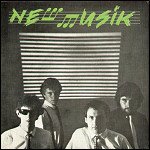 So Here We Are, Here We Go
So Here We Are, Here We Go
Tony described New Musik as "a project, a concept". Several sessions at TMC had seen the foursome muster a clutch of songs which would go on to form their first album 'From A to B'. Tony Mansfield was to say "it wasn't recorded as an album, the first real album was 'Anywhere'".
They needed a vehicle to hang these songs on, and New Musik seemed catchy enough. The first single was released in August 1979. 'Straight Lines' amply demonstrated their intentions. They were aiming for radio music. Easily digested, catchy, safe even. But of course there was a lot more to it than that, even if superficially it wasn't evident.
Tony, ably assisted by TMC studio engineer Pete Hammond, was fascinated by electronics, recording techniques and technology. Techniques such as the heavy use of compression (which made relatively quiet sounds prominent in the mix) and noise gates (to create contrast between silence and loud sections) were pushed to their limits. Though the digital era has made many of their experimentations commonplace (and far easier) nowadays, the recording and production aspects of New Musik's sound was well ahead of the curve and a major feature of the band's output.
Of course what also helped was the prodigious talents of the band, from Phil Towner's uncanny metronomic timekeeping, to Tony Hibbert's rock solid bass playing, and Clive's total mastery of keyboards and the amazing ability to instantly pick out the chords to a tune by ear. And, of course, when not fiddling with the mixing desk, Tony turned his hand to the vocals, guitars and keyboards to superb effect.
Despite 'Straight Lines' being a very radio-friendly tune, it failed to make a major dent in the charts, peaking at number 53. It was an opening salvo though, and it was only a matter of time.
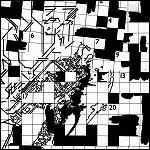 They Don't Want Your Name
They Don't Want Your Name
So the band's "signature tune" followed as the second single 'Living By Numbers', released in November 1979. Again radio-friendly, and this time the infection hook was taken by an increasingly interested audience.
Peaking at number 13 in the UK charts, their profile was further heightened by the tune being adapted for a Casio Advert on national TV, the "adding to history" lyrics being replaced by "Casio company". The "Don't Want Your Name" section was another quirky and innovative aspect that really caught on (many stories report that this section featured random members of the public, literally picked off the street outside the recording studio. However, good authority reveals it's actually the band members themselves).
Also notable is the non-album B side 'Sad Films', an excellent piece recorded at the pre New Musik sessions with Nick Straker on keyboards. New Musik's B-sides are a whole topic unto itself, and another intriguing aspect to the band.
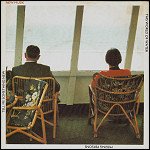 This All Goes So Much Deeper
This All Goes So Much Deeper
So, we reach 1980 with the first album on the starting blocks. Time to put another single on point duty, and a great one it was too. 'This World of Water' was another great tune, another great jingle, and though it peaked just outside the UK top 30 at number 31 it did enough to prove that the album would be no "one hit wonder".
Scrape the surface though, and the lyrics reveal a deeper side to the band. As Phil Towner once revealed, 'This World of Water' is actually about drowning in society. "You can drown but you still survive". It's a doomy message which is quite a characteristic of the band. On the surface, a consumable pop band. But, there's so much more going on underneath. And literally underneath, on the B side, was the excellent 'Missing Persons / Tell Me Something New' combo. The latter, especially, demonstrated Tony M's penchant for reversing sounds.
Anyway, 'This World of Water' did its job. With Christmas and New year well out of the way, it reminded the public what New Musik were all about. It was time for the first album.
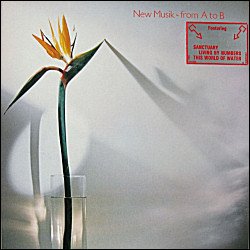 From A to B
From A to B
Released on May 1st 1980, 'From A to B' encapsulated everything New Musik were about. Despite Tony M's revelation that he never felt it was a "true album", it was received enthusiastically and is still considered by many fans to be their definitive work. Though peaking at only number 35, this still represented healthy sales back in the pre-download days of vinyl.
And it was of course the hey-day of "synth pop". Ultravox, Gary Numan, Human League, OMD; the list was endless and New Musik were very much "in there", emphasised by the synth riff on 'Sanctuary' also appearing on John Foxx's 'Underpass'. "It's on our demo's, honest" the band were to later proclaim. However the "synth pop" tag is perhaps slightly misleading with New Musik, prompted no doubt by their overt use of synthesisers and electronics in general, but their style was a far cry from the often cold, mechanistic automation of synth-pop bands.
To coincide with the album release, New Musik embarked on their first UK tour, as well as playing a few dates in Europe. Creating the New Musik sound live was not an easy task, especially since their whole approach was largely studio based. Hence the use of a reel-to-reel tape deck was evident, indeed openly displayed on-stage. No tapes of the concerts have ever surfaced, something fans would love to see.
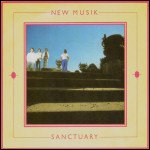 I've Still Yet To Find That Place In My Mind
I've Still Yet To Find That Place In My Mind
Of course, by the summer of 1980 work was by now well underway on their 2nd album 'Anywhere'. But there was still time for another single from the first - 'Sanctuary'. Frustratingly this also stalled just outside the top 30, but fans again lapped up the trio of excellent non-album B-sides 'She's a Magazine', 'Chik Musik' and 'Magazine Musik'.
Interviews with the band around this period further reveal their desire to experiment, push the boundaries, but not completely alienate their audience. But their "doomy" undertones also surface. "Certain bands tell you how wonderful life is. What is there to be happy about?" Tony M told Smash Hits.
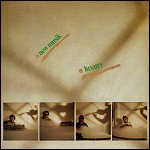 And Now You Need a Change of Style
And Now You Need a Change of Style
So the first fruits of the 2nd album appeared in January 1981. 'Luxury' was finished before the rest of the album and the record company were keen to release a new single. Hence it was the obvious choice. It was also notable for the Clive Gates instrumental on the B side 'The Office'.
However, things had changed a little. The commercial edge was perhaps more blunted. The sound a little more moody. Whatever the reason, the single failed to make any impact on the UK charts. No matter, the 2nd album was now raring to go.
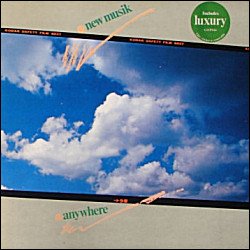 Anyway, Anywhere
Anyway, Anywhere
March 1981, 'Anywhere' was released. To many fans, their best album. The production was lush, complex, complete. Tony's vocals were awash with reverse echo. The Roland CR78 drum machine never sounded better.
It was released both on vinyl, and as a cassette with two extra tracks 'And' and 'Under Attack'. These tracks would become a holy grail for collectors until their appearance decades later on the Japanese CD releases.
'Anywhere' is quoted at being Tony M's favourite album. The second album can be difficult for many bands but in terms of composition it is their strongest work for many.
However, other factors started to now impact on the band. Their label GTO started to fold leaving New Musik to the mercy of the parent company CBS who were, perhaps understandably, more interested in marketing their own artists. 'Anywhere' never reached the level of success of 'From A to B' and as Tony M put it at the time, "things started to dwindle a bit".
A UK tour was embarked upon to promote the album, but that ended prematurely when Phil Towner fell ill. New Musik's last live appearance was at The Venue in London, 24th March 1981. This was not a great time for New Musik, despite musically it probably being their creative peak.
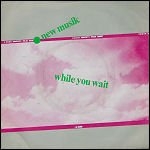 We Must Go All The Way
We Must Go All The Way
A follow-up single was released in April 1981, 'While You Wait'. For fans it's another crucial buy, with perhaps their strongest B-side offering in the form of 'From the Village' and 'Guitars' sandwiching an uncredited instrumental snippet which would later appear on 'Warp'.
In May 1981 a US compilation album was released called 'Sanctuary'. To support the album a US tour was planned in July. Sadly the tour was cancelled 1 week before it was planned to take place, owing to the ongoing illness of Phil Towner. And indeed, informed sources suggest this was the point at which Phil Towner and Tony Hibbert left the band.
However, prolific as ever, the remainder of the band had already started to work on their third album. An album to be heavily influenced both by circumstance, and the explosive advancement in music technology that was occurring at the time. We were on the cusp of the digital and computerised music age.
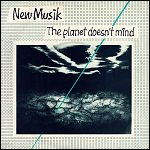 What on Earth is Really Happening?
What on Earth is Really Happening?
It was 6 months before the next activity on the New Musik front. September 1981 saw the release of a single called 'The Planet Doesn't Mind'. Superficially it was "business as usual". An excellent track, perhaps a slightly more stripped down approach but not a major departure. It was certainly New Musik, though the B side '24 Hours from Culture Part II' was very experimental and hinted at things to come.
Behind the scenes though, things were changing. GTO was breathing its last breath, but more drastic was the fact that a new percussionist had joined the band - Cliff Venner. Hence the 2nd New Musik line-up came to be. And the sound was then to change quite radically.
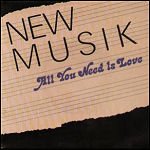 New Evolutionist
New Evolutionist
The 3rd album had been in the making for quite a while. A change in band line-up, and Tony now getting more into digital recording and computerised control, meant that it was taking shape in a very different direction. By early 1982 it was ready and a single was duly released to herald its arrival. A cover of a famous Beatles song may look a good idea on paper, but 'All You Need Is Love' was greeted savagely by the music press. More frustratingly it would later be revealed that New Musik's reinterpretation of the track, which would appear on the album, was classic NM. But it was too late. The damage was done.
Also notable was that GTO was no more, and this was their first release on the Epic label. But that's not why this single is worth picking up. It's worth picking up because of the fantastic (non-album) B-side 'Twelfth House'. A wonderful hark back to the lush, infectious New Musik sound of old.
Very much a single of two sides then. What would the album be like?
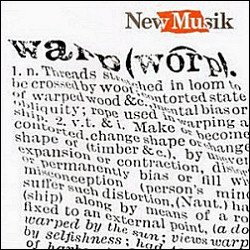 It's Begun to Warp
It's Begun to Warp
We didn't have to wait long. March 1982 saw the release of the band's third and final album 'Warp'. Commercially it flopped, but there was no surprise there. Musically it is an interesting mix of styles. Evolutionary tracks in the form of 'Hunting' and 'A Train on Twisted Tracks' rub shoulders with revolutionary material such as 'Green and Red (Respectively)'. The use of triggered sounds (such as sploshing water), though commonplace now, was leading-edge. Also sound quality is tremendous, being one of the first digitally mixed albums. The sound is more stripped down however, less lush. Most starkly this is evidenced by the album version of 'The Planet Doesn't Mind' which is a far cry from the single mix.
It has its place though. It is a true New Musik album, and its long overdue CD release was warmly greeted by fans. But the lack of commercial success, and Tony's increasing collaboration with other projects such as Yellow Magic Orchestra, was only going to end one way.
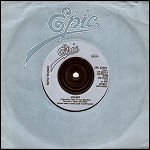 All Over Now System
All Over Now System
It's not clear exactly when New Musik broke up, it was probably very soon after 'Warp' was released, perhaps even before. There was time for just one more single, the title track together with 'Here Come The People Remix'. It was June 1982, and it was to be New Musik's last release.
Tony M went on to other projects, perhaps most notably his work with A-ha, Captain Sensible and YMO drummer Yukihiro Takahashi. Rumours of a 4th album occasionally surface. The best evidence was the single 'Home' released in November 1982 by a band called Planet Ha Ha. This was Tony M, his brother Lee and Rob Fisher (of Climie Fisher fame). The single was hastily withdrawn because of contractual issues, but it remains the seed that may well see that 4th album appear.
Somewhere. Sometime.
Graham G, March 2008.
